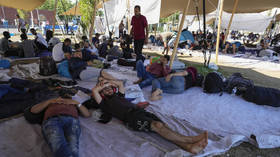Tuesday, 25 July 2023
As with most things Albo, he said one thing to get elected then did another in power.
During
the Chinese economic coercion push against Australia before and after
COVID, Albo consistently defended Beijing against Canberra.
However, a few months before the election he backflipped and said “China had changed”.
The moment he got elected he backflipped again and began Labor’s great grovel to Beijing to restore trade relations.
The kowtowing has been so daft and humiliating that it has been noticed as far away as Washington with some bewilderment.
Today
we can add further texture to the great grovel with the release of a
Productivity Commission report that shows how harmless the trade war was
to the Australian economy:
Australian exports proved to be
mostly resilient against these trade measures. For example, barley and
coal exporters were successful in finding other markets. The value of
beef and wheat exports to China did not experience significant falls –
likely due to the partial nature of the measure, which was limited to
certain abattoirs and shipments.
On the other hand, there were
falls in exports of Australian lobsters and wine, affecting producers
whose exports were concentrated on the Chinese market. That said, after
initially increasing exports to their original markets, wine exporters
developed new markets. In the case of products with limited
perishability, like wine, the costs to exporters might be from deferred
sales, rather than not being able to sell the good at all. And some
exporters may have even enjoyed an increase in the value of stock that
ages well. While these measures do not appear to have imposed
substantial costs on the Australian economy as a whole, some businesses
paid a heavy price.
…The effect of China’s trade measures on some
Australian exporters could have had broader implications on the
Australian and world economy after businesses, consumers, governments,
workers and capital owners adjusted to changes in the trade environment.
The Productivity Commission modelled the economy-wide effects of the
trade measures. This section presents the results of this modelling.
The
results indicate how trade adjusts to the disruptions and that although
some industries might have incurred significant costs as they adjusted,
economy-wide and global effects tend to be limited. Although the actual
restrictions took many different forms (table C.1), they are modelled
here as a tax imposed on Australian exports of the relevant goods to
China; the tax is calibrated to increase the tax-inclusive export price
to the point of making the export prohibitive. The model is designed to
illustrate how Australian and global production and trade reorganised to
adapt to the disruption.
The impact on growth was not a rounding error, as we said amid the wall-to-wall hysteria in the iMSM at the time.
Given
China’s near-complete powerlessness, why is Albo face down licking
Beijing’s boots instead of taking heed of the warning and building
Australian economic resilience for the next round of Chinese warfare?
Anonymous
